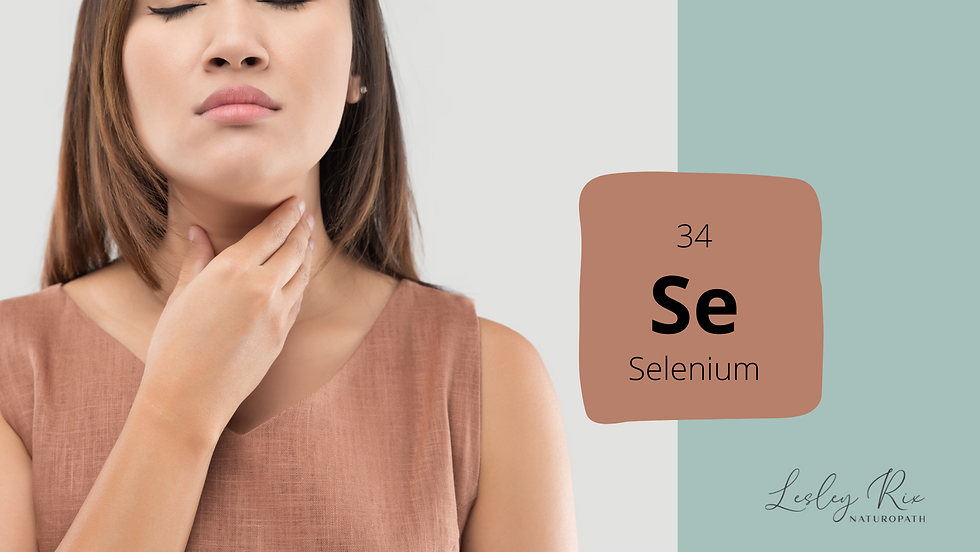Selenium & The Thyroid
- Lesley Rix
- Jun 8, 2021
- 3 min read
Updated: Aug 9, 2022

Selenium (Se) is an essential micronutrient of diet with many benefits including acting as an antioxidant, an anti-inflammatory & can increase active thyroid hormone production.
Selenium is absorbed from the soil into plants. Unfortunately, in Australia, many regions have low concentrations in the soil, therefor the plants grown are low in selenium. Foods that contain selenium include alfalfa, barley, Brazil nuts, broccoli, cashews, celery, cheese, eggs, fish, flour - especially rye/wheat, garlic, mushrooms, oats, onions, red meat and sesame seeds.
In the body the thyroid hormones are T4 which is the inactive hormone & T3 which is the active thyroid hormone. Selenium is one of several nutrients required to convert T4 into T3. When examining pathology testing a person may have higher T4, moderately low T3, but a normal thyroid stimulating hormone (TSH). As TSH is the standard test in Australia for thyroid issues, this deficiency often goes un-noticed as the TSH is within the normal range.
Selenium reduces inflammation of the thyroid in those with Hashimoto's Thyroiditis, which is an autoimmune disease affecting the thyroid. Selenium supplementation has been shown to reduce the number of antibodies in Hashimoto’s patients. Often in clinic I recommend selenium prior to increasing iodine rich foods or supplements as there is a reduction in risk to the thyroid if selenium is adequate as it can reduce inflammation or oxidative stress to the thyroid.
A recent population-based study in China found circumstantial evidence that low Selenium intake is associated with thyroid autoimmunity. In case of selenium deficiency, the excessive amounts of Hydrogen peroxide generated led to immoderate production of T4 and damage of thyroid cells. Selenium deficiency also increases the weight of the thyroid and combined with iodine deficiency, may lead to a further thyroid swelling. Sometimes this can be felt as a lump in the throat or a cough. Selenium deficiency was also found in studies of Type 2 Diabetics. Their Hb1ac improved with selenium supplementation, showing that micronutrients have far and reaching consequences throughout the body.
Graves is an autoimmune disease of the thyroid which if left untreated can cause eye disease amongst other symptoms. Supplementation with selenium for a study of patients with mild Graves’ ophthalmopathy showed 100 µg twice daily was beneficial. After six months of therapy the researchers observed a significant improvement in the quality of life of their patients, less intensity in the ophthalmological changes, and suppression of orbitopathy progression into its more severe forms.
The detail here is in the dose. Selenium can be toxic in high doses, so it is not a case of more is better. Chronic ingestion of large quantities of Selenium may have adverse effects. A Selenium intake of 50-400g/d is considered a safe range for adults, while 850-900g could cause toxicity. Excessive consumption of selenium causes classical symptoms of intoxication: systemic weakness, nausea, vomiting, and diarrhoea; moreover, neurological disorders may occur. Excess selenium supplementation can have the detrimental effect of reducing thyroid hormone production. The therapeutic range of benefit is narrower for selenium than other minerals so care must be taken, even so, it is one of the most beneficial nutrients for the thyroid and deficiency should be considered in both hyper & hypo thyroid conditions. Obviously consulting with your health provider to discuss this important nutrient is key. Heroic doses can have the exact opposite effect than you require, but when the dose is correct for the individual, selenium can be life changing.
References
Liontiris MI, Mazokopakis EE. A concise review of Hashimoto thyroiditis (HT) and the importance of iodine, selenium, vitamin D and gluten on the autoimmunity and dietary management of HT patients.Points that need more investigation. Hell J Nucl Med. 2017 Jan-Apr;20(1):51-56. doi: 10.1967/s002449910507. Epub 2017 Mar 20. PMID: 28315909.
Stuss M, Michalska-Kasiczak M, Sewerynek E. The role of selenium in thyroid gland pathophysiology. Endokrynol Pol. 2017;68(4):440-465. doi: 10.5603/EP.2017.0051. PMID: 28819948.



Comments